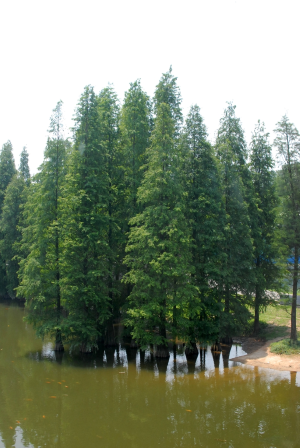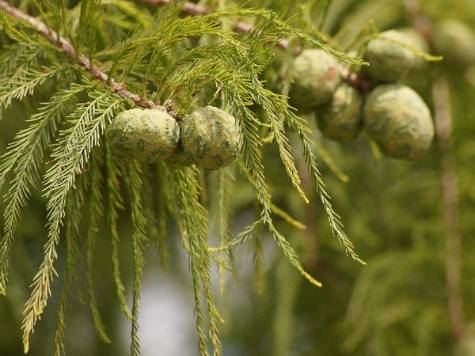Bald cypress
 This tree is native to southern swamps, bayous, and rivers in coastal areas from Maryland to Texas and the lower Mississippi River valley. Despite its native range being mainly swamps and river beds, the bald cypress is surprisingly drought-hardy and rated as one of the more drought-tolerant trees you can plant once they are established. One of the unique features of this tree is that it is a deciduous conifer, which means it loses its needles every year and regrows them in the spring, which gives it the common name “bald” for its lack of needles in the winter. This tree can grow up to 150 feet tall and 30 feet wide, with a trunk ranging in diameter from 3 to 6 feet at maturity. They tend to be smaller in a landscape setting as the trees are far younger than in their native range.
This tree is native to southern swamps, bayous, and rivers in coastal areas from Maryland to Texas and the lower Mississippi River valley. Despite its native range being mainly swamps and river beds, the bald cypress is surprisingly drought-hardy and rated as one of the more drought-tolerant trees you can plant once they are established. One of the unique features of this tree is that it is a deciduous conifer, which means it loses its needles every year and regrows them in the spring, which gives it the common name “bald” for its lack of needles in the winter. This tree can grow up to 150 feet tall and 30 feet wide, with a trunk ranging in diameter from 3 to 6 feet at maturity. They tend to be smaller in a landscape setting as the trees are far younger than in their native range.
As a conifer, this tree does have “cones” in the form of green balls, as seen in the photo above. The bald cypress is easily grown in average medium to wet soils in full sun to part shade but will also tolerate dry areas or upland soils. Bald cypress develop “knees” or “cypress knees” when grown in standing or near water. These knees allow the roots to take in oxygen from the air when oxygen is not available due to the water in the soil. These knees are less common in dry areas; however, care should be taken when mowing around the trees to avoid damaging the mower on these knees.

This tree is an excellent option for areas that stay damp for extended periods, such as a street tree or a shade tree in your yard. Because these trees are common in coastal areas, they naturally have some salt tolerance in regions that struggle with that issue. This tree grows relatively quickly and can reach 40-50 feet in 15-25 years. These trees are relatively disease and insect-free. The wood is naturally rot-resistant and is commonly used in various applications when the trees are harvested. One downside of this tree would be that the needles can be a pain to clean up in the fall, much like any tree, but in many cases, the benefits far outweigh the issues.

Have questions? Contact our office where our Horticulture Extension Agent will assist you with questions.
Phone: (316) 321-9660
Email: callae@ksu.edu